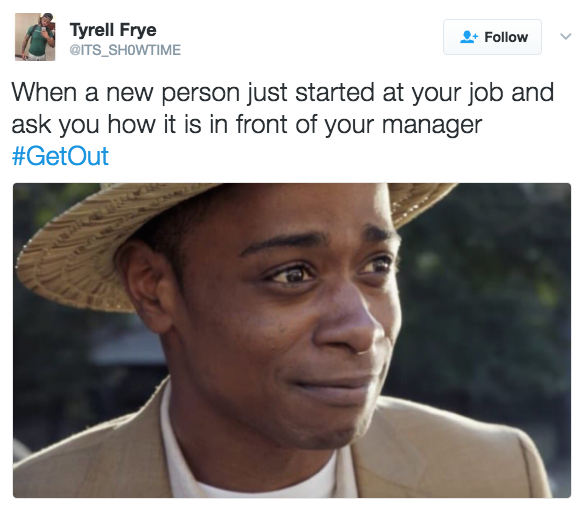You’ve probably seen it somewhere on social media – that iconic image from the movie "Get Out" turned into a meme sensation. But have you ever wondered how it all started, why it became so popular, and what makes it such a powerful cultural phenomenon? Let’s dive into the world of "Get Out" memes and uncover everything you need to know about this viral trend.
Alright, let’s be real for a second – memes are like the universal language of the internet. They connect people, spark conversations, and sometimes even shape how we perceive certain topics. The "Get Out" meme is one of those rare gems that managed to transcend its origins and become a symbol of so much more than just a funny picture.
But here’s the thing – not everyone gets the full context behind this meme. Some people see it and think, “What’s the big deal?” Others might get the humor but miss out on the deeper layers of meaning. That’s where we come in. This article is your ultimate guide to understanding the "Get Out" meme, its origins, evolution, and why it continues to resonate with audiences worldwide.
Read also:Xxx Hot
What Exactly Is the Get Out Meme?
The "Get Out" meme refers to a series of images derived from Jordan Peele’s critically acclaimed horror film "Get Out" (2017). The most popular iteration features the protagonist, Chris Washington (played by Daniel Kaluuya), holding up his hands in a gesture of surrender or disbelief. This image has been repurposed countless times to convey shock, confusion, or disapproval in various contexts.
Now, here’s the kicker – the meme isn’t just about the image itself. It’s about the versatility of the situation it represents. Whether it’s reacting to something absurd, pointing out hypocrisy, or simply expressing frustration, the "Get Out" meme does it all. And trust me, there’s a reason why it’s become such a go-to choice for meme creators.
Why Did the Get Out Meme Go Viral?
There’s no denying that the "Get Out" meme exploded in popularity almost overnight. But why did it resonate so strongly with internet users? To answer that, we need to look at a few key factors:
- Cultural Relevance: The film "Get Out" tackled heavy themes like racial tension, social injustice, and identity. These topics were – and still are – deeply relevant to many people’s lives.
- Iconic Imagery: The scene where Chris raises his hands is visually striking and easy to interpret. It’s the perfect canvas for meme creators to layer their own messages on top.
- Emotional Resonance: The meme captures a universal feeling of disbelief or frustration. Who hasn’t been in a situation where you just want to say, “Hold up, what is this madness?”
Combine all these elements, and you’ve got a recipe for viral success. People connected with the meme because it spoke to their experiences, whether they realized it or not.
Origins of the Get Out Meme
Let’s rewind a bit and talk about where it all began. The "Get Out" meme first emerged shortly after the film’s release in 2017. Fans quickly recognized the potential of Chris’s “hands up” moment and started creating memes around it. At first, the memes stayed relatively niche, shared mostly within fan communities.
But as the film gained more mainstream attention, so did the meme. It wasn’t long before "Get Out" references started popping up everywhere, from Twitter threads to Instagram captions. And the rest, as they say, is history.
Read also:Plumpymage
How Did the Film Influence the Meme?
The brilliance of "Get Out" lies in its ability to blend horror, suspense, and social commentary into one cohesive narrative. This layered approach made it ripe for reinterpretation in the form of memes. Here’s how the film influenced the meme’s rise:
- Character Dynamics: Chris’s reactions throughout the movie are relatable and authentic, making them ideal for meme material.
- Symbolism: The film uses subtle (and not-so-subtle) symbolism to highlight issues like systemic racism and privilege. These themes naturally lent themselves to meme culture, where humor often serves as a form of critique.
- Timeless Appeal: Even years after its release, "Get Out" remains relevant. Its messages continue to resonate with audiences, ensuring that the meme stays fresh and engaging.
Evolution of the Get Out Meme
Like any good meme, the "Get Out" meme didn’t stay static. Over time, it evolved to reflect changing trends and cultural shifts. Here’s a brief timeline of its evolution:
- Early Days (2017): Initially, the meme focused on direct references to the film, often poking fun at specific scenes or lines.
- Mainstream Adoption (2018-2019): As the meme gained wider recognition, creators began using it in more diverse contexts, such as political commentary or pop culture references.
- Modern Usage (2020-Present): Today, the "Get Out" meme is used to address everything from current events to personal anecdotes. Its adaptability ensures that it remains relevant no matter the topic.
What’s fascinating is how the meme has managed to stay true to its roots while embracing new forms of expression. It’s a testament to the film’s lasting impact and the creativity of its fans.
Popular Variations of the Get Out Meme
Let’s take a closer look at some of the most popular variations of the "Get Out" meme:
- Reaction Memes: These use the "Get Out" image to depict shock or disbelief in response to a particular situation.
- Dialogue Memes: These add speech bubbles to the image, creating humorous or thought-provoking exchanges.
- Parody Memes: These reimagine the scene entirely, often substituting the original characters with entirely different ones.
Each variation brings something unique to the table, keeping the meme fresh and engaging for audiences.
The Cultural Impact of the Get Out Meme
So, what’s the big deal about the "Get Out" meme? Why does it matter? Well, for starters, it’s a prime example of how pop culture can influence broader societal conversations. By using humor and relatability, the meme helps break down complex issues into digestible chunks.
Moreover, it highlights the power of representation in media. Seeing a Black character like Chris at the center of a global phenomenon sends a powerful message about visibility and inclusivity. It shows that stories from underrepresented communities can resonate with audiences worldwide.
How Has the Meme Contributed to Social Discourse?
The "Get Out" meme has played a significant role in shaping social discourse around issues like race, privilege, and inequality. Here are a few examples:
- Racial Justice Movements: During protests and discussions about racial justice, the meme has been used to highlight systemic issues in a way that’s both impactful and accessible.
- Political Commentary: Creators have leveraged the meme to critique political figures and policies, using humor as a tool for social critique.
- Everyday Conversations: On a more personal level, the meme has sparked countless discussions about identity, belonging, and the struggles of navigating a complex world.
It’s this versatility that makes the "Get Out" meme so powerful. It’s not just a joke – it’s a conversation starter.
Get Out Meme and Internet Culture
Internet culture thrives on trends, and the "Get Out" meme is one of the most enduring ones out there. But why has it stood the test of time when so many others have faded into obscurity? Part of it comes down to timing – the meme emerged at a moment when people were hungry for meaningful discussions about race and representation. But it’s also about the meme’s ability to adapt and evolve.
In today’s fast-paced digital landscape, memes come and go in the blink of an eye. Yet the "Get Out" meme has managed to maintain its relevance by staying flexible and open to new interpretations. It’s a reminder that the best memes aren’t just funny – they’re also smart, relevant, and thought-provoking.
Lessons We Can Learn from the Get Out Meme
So, what can we take away from the success of the "Get Out" meme? Here are a few key lessons:
- Authenticity Matters: Memes that resonate with people are often those that feel genuine and relatable.
- Context Is Everything: Understanding the cultural and historical context behind a meme can enhance its impact.
- Creativity Knows No Bounds: Don’t be afraid to experiment with different formats and ideas – you never know what might catch on!
These lessons apply not just to memes, but to content creation in general. If you want to make an impact, you need to connect with your audience on a deeper level.
Future of the Get Out Meme
So, where does the "Get Out" meme go from here? While no one can predict the future of internet trends with certainty, it’s safe to say that the meme will continue to evolve. As long as people find new ways to interpret and apply its imagery, it will remain a staple of online culture.
What’s exciting is that the meme’s legacy extends beyond the internet. It’s part of a larger conversation about representation, identity, and the power of storytelling. And that’s something worth celebrating.
Predictions for the Next Chapter
Here are a few predictions for the "Get Out" meme’s next chapter:
- New Formats: As technology advances, we may see the meme adapted into new formats, such as augmented reality or interactive experiences.
- Broader Themes: Creators will likely continue to push the boundaries of what the meme can represent, exploring even more diverse topics and perspectives.
- Legacy Projects: The meme’s influence may inspire future filmmakers, artists, and creators to tackle similar themes in their work.
Only time will tell how far the "Get Out" meme’s reach will extend, but one thing’s for sure – it’s here to stay.
Conclusion: Why the Get Out Meme Matters
In conclusion, the "Get Out" meme is more than just a viral sensation. It’s a cultural phenomenon that reflects the complexities of our modern world. From its humble beginnings as a reaction to a single scene in a movie to its current status as a global icon, the meme has proven its staying power time and time again.
So, the next time you see a "Get Out" meme, take a moment to appreciate its depth and significance. And if you’re feeling inspired, why not create your own version? After all, the beauty of memes lies in their ability to bring people together and spark meaningful conversations.
Before you go, don’t forget to leave a comment and share your thoughts on the "Get Out" meme. Who knows – your insights might just inspire the next big trend!
Table of Contents


